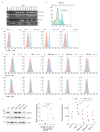Genetic Correction of IL-10RB Deficiency Reconstitutes Anti-Inflammatory Regulation in iPSC-Derived Macrophages
- PMID: 33804706
- PMCID: PMC8003874
- DOI: 10.3390/jpm11030221
Genetic Correction of IL-10RB Deficiency Reconstitutes Anti-Inflammatory Regulation in iPSC-Derived Macrophages
Abstract
Patient material from rare diseases such as very early-onset inflammatory bowel disease (VEO-IBD) is often limited. The use of patient-derived induced pluripotent stem cells (iPSCs) for disease modeling is a promising approach to investigate disease pathomechanisms and therapeutic strategies. We successfully developed VEO-IBD patient-derived iPSC lines harboring a mutation in the IL-10 receptor β-chain (IL-10RB) associated with defective IL-10 signaling. To characterize the disease phenotype, healthy control and VEO-IBD iPSCs were differentiated into macrophages. IL-10 stimulation induced characteristic signal transducer and activator of transcription 3 (STAT3) and suppressor of cytokine signaling 3 (SOCS3) downstream signaling and anti-inflammatory regulation of lipopolysaccharide (LPS)-mediated cytokine secretion in healthy control iPSC-derived macrophages. In contrast, IL-10 stimulation of macrophages derived from patient iPSCs did not result in STAT3 phosphorylation and subsequent SOCS3 expression, recapitulating the phenotype of cells from patients with IL-10RB deficiency. In line with this, LPS-induced cytokine secretion (e.g., IL-6 and tumor necrosis factor-α (TNF-α)) could not be downregulated by exogenous IL-10 stimulation in VEO-IBD iPSC-derived macrophages. Correction of the IL-10RB defect via lentiviral gene therapy or genome editing in the adeno-associated virus integration site 1 (AAVS1) safe harbor locus led to reconstitution of the anti-inflammatory response. Corrected cells showed IL-10RB expression, IL-10-inducible phosphorylation of STAT3, and subsequent SOCS3 expression. Furthermore, LPS-mediated TNF-α secretion could be modulated by IL-10 stimulation in gene-edited VEO-IBD iPSC-derived macrophages. Our established disease models provide the opportunity to identify and validate new curative molecular therapies and to investigate phenotypes and consequences of additional individual IL-10 signaling pathway-dependent VEO-IBD mutations.
Keywords: IL-10 signaling; disease modeling; gene editing; gene therapy; very early-onset inflammatory bowel disease.
Conflict of interest statement
The authors declare no conflict of interest.
Figures




References
-
- Engelhardt K.R., Shah N., Faizura-Yeop I., Kocacik Uygun D.F., Frede N., Muise A.M., Shteyer E., Filiz S., Chee R., Elawad M., et al. Clinical outcome in IL-10– and IL-10 receptor–deficient patients with or without hematopoietic stem cell transplantation. J. Allergy Clin. Immunol. 2013;131:825–830.e9. doi: 10.1016/j.jaci.2012.09.025. - DOI - PubMed
-
- Kotlarz D., Beier R., Murugan D., Diestelhorst J., Jensen O., Boztug K., Pfeifer D., Kreipe H., Pfister E., Baumann U., et al. Loss of Interleukin-10 Signaling and Infantile Inflammatory Bowel Disease: Implications for Diagnosis and Therapy. Gastroenterology. 2012;143:347–355. doi: 10.1053/j.gastro.2012.04.045. - DOI - PubMed
-
- Kelsen J.R., Sullivan K.E., Rabizadeh S., Singh N., Snapper S., Elkadri A., Grossman A.B. North American Society for Pediatric Gastroenterology, Hepatology, and Nutrition Position Paper on the Evaluation and Management for Patients With Very Early-onset Inflammatory Bowel Disease. J. Pediatr. Gastroenterol. Nutr. 2020;70:389–403. doi: 10.1097/MPG.0000000000002567. - DOI - PubMed
Grants and funding
LinkOut - more resources
Full Text Sources
Other Literature Sources
Miscellaneous

